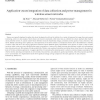Free Online Productivity Tools
i2Speak
i2Symbol
i2OCR
iTex2Img
iWeb2Print
iWeb2Shot
i2Type
iPdf2Split
iPdf2Merge
i2Bopomofo
i2Arabic
i2Style
i2Image
i2PDF
iLatex2Rtf
Sci2ools
JPDC
2007
2007
Application-aware integration of data collection and power management in wireless sensor networks
Sensors are typically deployed to gather data about the physical world and its artifacts for a variety of purposes that range from environment monitoring, control, to data analysis. Since sensors are resource constrained, often sensor data is collected into sensor databases that reside at (more powerful) servers. A natural tradeoff exists between resources (bandwidth, energy) consumed and the quality of data collected at the server. Blindly transmitting sensor updates at a fixed periodicity to the server results in a suboptimal solution due to the differences in stability of sensor values and due to the varying application needs that impose different quality requirements across sensors. In order to adapt to these variations while at the same time optimizing the energy consumption of sensors, this paper proposes three different models and corresponding data collection protocols. We analyze all three models with a Markov state machine formulation, and either derive closed forms for the...
Related Content
| Added | 16 Dec 2010 |
| Updated | 16 Dec 2010 |
| Type | Journal |
| Year | 2007 |
| Where | JPDC |
| Authors | Qi Han, Sharad Mehrotra, Nalini Venkatasubramanian |
Comments (0)

